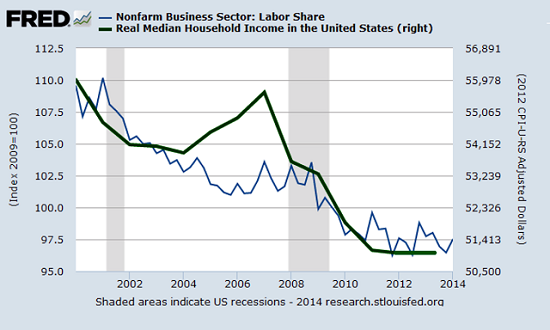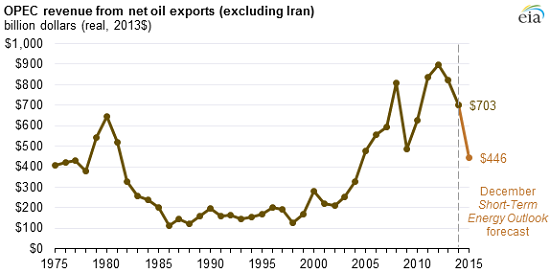Lies are no substitute for truth and fantasy is no substitute for reality.
Follow the money is a good start--but what matters going forward is income, and most especially, net income and disposable income. Debt is important, money/capital flow is important, but when push comes to shove, all that matters is having net income/disposable income: to service debts, to invest, to spend.
Debt can be substituted for income, but not for long. Central banks have been playing a game for six long years: by lowering interest rates and making credit available, the central banks have encouraged households, enterprises and governments to substitute borrowed money (debt) for income.
This works as a stop-gap, but debt accrues a funny thing called interest that eventually eats the borrower alive. Income is (supposedly) the driver of stock valuations, the financial foundation of rental property and the ultimate arbiter of solvency: households, enterprises and governments whose income cannot meet their debt and spending obligations are insolvent and eventually declare bankruptcy.
The reality that all that really matters is income incentivizes gaming income. Corporations and their officers/stockholders benefit greatly when net income appears to rise smartly, as rising income boosts stock prices and the value of stock options.
Following the income leads us to wonder how the 99% of households whose income is declining in real terms can borrow and spend more every year.
Following the income leads us to wonder how OPEC oil exporters will manage with $250 billion less income in 2015, after suffering a $200 billion decline in 2014.That's a total of $450 billion of income that's vanished in a few years.
Since OPEC accounts for about 40% of global oil production, that means oil producers globally will earn $1 trillion less than they did in 2012.
Such primary industrial income has a multiplier effect, which means every $1 of oil income that vanishes means $3 down the spending chain vanishes as workers earn less or are laid off, the stores that depended on oil workers' spending take a hit, and so on down the line.
Thus the reality is the loss of income isn't merely $1 trillion--it's more on the order of $4 trillion, as the multiplier effect subtracts income from everyone in the food chain who depends on oil revenues in a secondary or tertiary role.
Income matters for another reason. Most households, enterprises and governments spend the vast majority of their income in one way or another. If income declines by 5%, that may not appear like much. But if the household, enterprise or government spends 98% of its income on debt service and essentials, that 5% decline puts them in the red by 3%.
It may be possible to borrow more to fill that gap--in essence, borrowing money to pay the interest on previous debt--but this is a financial Black Hole, as there is less income to service rising interest payments.
Once the gravity of insufficient income pulls the household, enterprise or government over the event horizon of insolvency, implosion is inevitable.
So when you read about ever-rising corporate profits, ask if that's pro forma or actual net income. When the government claims its deficits are declining, check whether its debts are rising faster than the media is reporting.
When your neighbor seems to be spending more, ask if they're making more net income, or simply borrowing more.
Borrowed money is no substitute for net income. The global economy has been living a Grand Lie for the past six years: that borrowing money can be substituted for declining income, and bogus accounting can be substituted for real net income.
Six long years of lies has persuaded many that the lies can be sustained for another six years--or even sixty years.
But lies are no substitute for truth and fantasy is no substitute for reality. The erosion of net income will eventually matter, maybe not in six years but within six months.
Get a Job, Build a Real Career and Defy a Bewildering Economy(Kindle, $9.95)(print, $20)
 Are you like me? Ever since my first summer job decades ago, I've been chasing financial security. Not win-the-lottery, Bill Gates riches (although it would be nice!), but simply a feeling of financial control. I want my financial worries to if not disappear at least be manageable and comprehensible.And like most of you, the way I've moved toward my goal has always hinged not just on having a job but a career.
Are you like me? Ever since my first summer job decades ago, I've been chasing financial security. Not win-the-lottery, Bill Gates riches (although it would be nice!), but simply a feeling of financial control. I want my financial worries to if not disappear at least be manageable and comprehensible.And like most of you, the way I've moved toward my goal has always hinged not just on having a job but a career.
You don't have to be a financial blogger to know that "having a job" and "having a career" do not mean the same thing today as they did when I first started swinging a hammer for a paycheck.
Even the basic concept "getting a job" has changed so radically that jobs--getting and keeping them, and the perceived lack of them--is the number one financial topic among friends, family and for that matter, complete strangers.
So I sat down and wrote this book: Get a Job, Build a Real Career and Defy a Bewildering Economy.
It details everything I've verified about employment and the economy, and lays out an action plan to get you employed.
I am proud of this book. It is the culmination of both my practical work experiences and my financial analysis, and it is a useful, practical, and clarifying read.
Test drive the first section and see for yourself. Kindle, $9.95 print, $20
"I want to thank you for creating your book Get a Job, Build a Real Career and Defy a Bewildering Economy. It is rare to find a person with a mind like yours, who can take a holistic systems view of things without being captured by specific perspectives or agendas. Your contribution to humanity is much appreciated."
Laura Y.
Gordon Long and I discuss The New Nature of Work: Jobs, Occupations & Careers(25 minutes, YouTube)
NOTE: Contributions/subscriptions are acknowledged in the order received. Your name and email remain confidential and will not be given to any other individual, company or agency.
| Thank you, Daniel E. ($5.25), for yet another marvelously generous contribution to this site-- I am greatly honored by your steadfast support and readership. |
|


 Are you like me? Ever since my first summer job decades ago, I've been chasing financial security. Not win-the-lottery, Bill Gates riches (although it would be nice!), but simply a feeling of financial control. I want my financial worries to if not disappear at least be manageable and comprehensible.And like most of you, the way I've moved toward my goal has always hinged not just on having a job but a career.
Are you like me? Ever since my first summer job decades ago, I've been chasing financial security. Not win-the-lottery, Bill Gates riches (although it would be nice!), but simply a feeling of financial control. I want my financial worries to if not disappear at least be manageable and comprehensible.And like most of you, the way I've moved toward my goal has always hinged not just on having a job but a career.


























